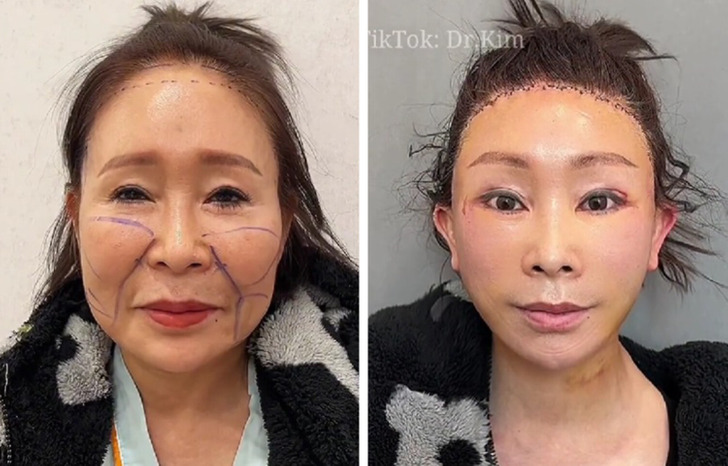Investigating the Psychological and Social Factors That Drive Individuals to Take Into Consideration Plastic Surgery as a Method of Renovation
The choice to go after plastic surgery commonly prolongs beyond plain aesthetics, linking with social and mental dynamics that warrant detailed assessment. Elements such as self-worth, prevalent social charm criteria, and the prevalent influence of social media merge to shape specific inspirations for surgical improvement. As these impacts come to be significantly famous, comprehending the underlying social and psychological contexts is important. What remains to be discovered is the extensive impact these aspects have not only on personal identification yet likewise on wider societal norms and worths bordering charm and acceptance.
The Function of Self-worth
Self-esteem substantially affects an individual's decision to go after cosmetic surgery. Individuals with reduced self-worth often view themselves in an unfavorable light, leading to sensations of inadequacy regarding their physical look. This adverse self-perception can drive them to look for medical interventions as a method of improving their self-image. The wish for renovation in one's look is regularly connected to a belief that such changes will elevate their overall self-respect and confidence.

Inevitably, the role of self-worth in the decision-making procedure relating to cosmetic surgical procedure highlights the complicated interplay between body photo, personal fulfillment, and mental health and wellness. Comprehending this partnership is crucial for healthcare experts to ensure that clients are making informed choices rooted in practical expectations and psychological health.
Social Appeal Criteria
Influenced by prevalent media portrayals and cultural stories, societal elegance criteria play a vital duty in shaping individuals' understandings of their very own bodies. These standards are often identified by an idealized form of beauty that highlights qualities such as slimness, balance, and youthful vigor. As these ideals are perpetuated via numerous channels, consisting of tv, film, and advertising, individuals regularly internalize these messages, leading to discontentment with their natural appearance.
The effects of these societal standards extend beyond aesthetic choices; they can influence self-esteem, psychological wellness, and social connections. Individuals that perceive themselves as disappointing these criteria may experience sensations of insufficiency, prompting a wish for cosmetic surgery as a way of accomplishing societal authorization. This quest is frequently sustained by the belief that adjusting to these ideals will certainly improve not just physical appearance but additionally social standing and personal fulfillment.

Impact of Social Network
The impact of societal charm requirements is more magnified by the surge of social media sites systems, where curated images and idyllic representations of beauty are common. Individuals are frequently exposed to filteringed system and edited pictures, which commonly portray unattainable physical features. This direct exposure cultivates a society of contrast, leading individuals to analyze their own appearance versus these commonly unrealistic benchmarks.
Social media site influencers and celebs regularly advertise cosmetic treatments, normalizing the concept that surgical improvements are a feasible methods for achieving societal ideals (plastic surgery rancho cucamonga). The presence of these enhancements can create a perception that undertaking plastic surgery is a typical technique, therefore affecting individuals to consider similar interventions as a pathway to improved self-confidence and social acceptance
Furthermore, the interactive nature of social media sites permits for instant responses with likes and remarks, further enhancing the need to comply with popular elegance requirements. Such communications can look at more info intensify feelings of inadequacy and drive people toward cosmetic surgical procedure as a way of gaining recognition. Inevitably, social media plays a crucial role in forming assumptions of charm, which dramatically impacts the decision-making procedures bordering plastic surgery.

Social Point Of Views on Look
Throughout different cultures, assumptions of appearance are deeply rooted in historic, social, and financial contexts, forming people' views on charm and charm. In numerous cultures, look works as a substantial pen of identification, affecting social status, professional possibilities, and individual partnerships. For example, in some societies, light skin is often connected with riches and opportunity, while others might glorify darker complexion as icons of stamina and credibility.
Moreover, typical elegance requirements are commonly bolstered through cultural stories, media depictions, and family influences, leading to differing ideals throughout different areas (plastic surgery rancho cucamonga). In Western cultures, the emphasis on youth and physical conditioning usually drives people toward cosmetic improvement, while in specific Eastern cultures, even more refined changes lined up with standard appearances might be favored
Globalization and the expansion of electronic media have actually further made complex these characteristics, creating a hybridization of elegance perfects that transcends geographical boundaries. As individuals significantly navigate these social narratives, the stress to adapt specific appearance standards can cause the wish for cosmetic surgery, reflecting a complex interaction of cultural values and personal desires. visit the site Comprehending these cultural perspectives is crucial in dealing with the motivations behind plastic surgery factors to consider.
Psychological Effects of Plastic Surgery
Lots of people seeking cosmetic surgery record experiencing profound emotional effects that can dramatically alter their self-perception and emotional well-being - plastic surgery rancho cucamonga. The wish for physical improvement frequently stems from underlying issues such as low self-esteem, body dysmorphic problem, or societal stress pertaining to beauty requirements. For some, the instant post-operative stage can lead to a short-term boost in confidence and complete satisfaction with their appearance, promoting a feeling of empowerment
However, these positive sensations might not be sustaining. Study suggests that while some individuals experience improved self-confidence, others may encounter heightened anxiousness or clinical depression if their assumptions are not satisfied. This discrepancy can develop from impractical perfects perpetuated by media depiction and cultural narratives surrounding appeal.
In addition, the psychological implications of cosmetic surgical treatment expand beyond the individual. Relationships with household and close friends might be stressed as social characteristics shift, leading to feelings of seclusion or alienation. Eventually, the mental effects of plastic surgery are complicated and diverse, calling for mindful consideration by both potential individuals and doctor to make sure informed decision-making and reasonable expectations.
Conclusion
To conclude, the choice to pursue plastic surgery is considerably influenced by a mix of self-esteem concerns, societal beauty standards, and social perspectives on look. The prevalent reach of social media further worsens these pressures, promoting impractical suitables that people find out this here usually make every effort to attain. Understanding these emotional and social elements is necessary for resolving the motivations behind cosmetic surgical procedure, highlighting the need for a much more nuanced conversation bordering appeal and self-acceptance in contemporary culture.
The choice to seek cosmetic surgery usually expands beyond plain aesthetic appeals, intertwining with psychological and social dynamics that warrant extensive evaluation. Eventually, social media plays a crucial function in forming assumptions of beauty, which significantly influences the decision-making procedures bordering cosmetic surgery.
As people increasingly browse these social stories, the stress to conform to specific appearance criteria can lead to the wish for cosmetic surgical treatment, reflecting an intricate interplay of social values and personal desires.In conclusion, the decision to go after cosmetic surgery is significantly influenced by a combination of self-esteem problems, social elegance criteria, and cultural perspectives on appearance. Understanding these psychological and social elements is vital for addressing the motivations behind cosmetic surgery, highlighting the demand for a more nuanced conversation bordering beauty and self-acceptance in modern society.